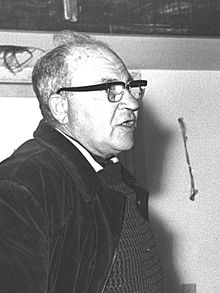
Summary
Michael Evenari (hebr.: מיכאל אבן-ארי, even-ari meaning lion's stone; born as Walter Schwarz 9 October 1904 in Metz – 15 April 1989 in Jerusalem)[1] was an Israeli botanist originally from Germany.


Life and career edit
Early life and education in Germany edit
Evenari was born as Walter Schwarz[2] to parents who identified as German Jews.[3] They lived as merchants in Lorraine, a province that changed hands repeatedly between France and Germany.[3] After World War I Metz became French again, and the Schwarz family opted for Germany, being forced to emigrate.[3] Evenari was a brother-in-law of writer Gerson Stern.[3] Evenari grew up close to Marburg and Buchenau in Hesse.[2] He studied botany at Darmstadt University of Technology and received his doctorate 1927 under the auspices of Martin Möbius.[2]
British Mandate and Israel edit
Evenari fled Nazi Germany on 1 April 1933 and was active in Jerusalem as professor at the Hebrew University of Jerusalem.[4]
Evenari joined Hagana and fought in the 1948 Palestine war.[3]
His works on the Nabataeans runoff rainwater management was crucial for modern Israeli agriculture and explained as well how the Nabataean culture was able to supply thousands of inhabitants in a similar arid climate. Evenari showed that the runoff rainwater collection systems concentrate water from larger areas and in so far allow to grow plants with higher water needs in the given arid environment. The mechanism explained a variety of ancient agricultural features, terraced wadis, channels for collecting runoff rainwater, and the phenomenon of "Tuleilat el-Anab", grape mounds.[dubious ][5]
Evenari himself cared about the cultural heritage of the Bedouin and saw them more as 'fathers' than 'sons of the desert'.[6][dubious ]
He worked as well on algae fuel, a special sort of renewable resource and biofuel.[7]
Awards and honours edit
In 1966, Evenari was appointed member of the Leopoldina, the German national academy of sciences, and in 1977 his alma mater, the Darmstadt University of Technology, provided him with an honorary doctorate. Evenari received the Israel Prize in 1986 and in 1988, together with Otto Ludwig Lange, the Balzan Prize. In 2001, the Evenarí Forum, a Darmstadt-based centre for German-Jewish studies in the fields of technology, nature sciences, history and cultural studies, was named in his honour, and in 2010 a Stolperstein bearing his name was laid in the Darmstadt university campus.[8]
Published books, a selection edit
- together with Leslie Shanan and Naphtali Tadmor: The Negev. The Challenge of a Desert. Harvard University Press, Cambridge (Mass.) 1971; 1982, ISBN 0674606728
- Ökologisch-landwirtschaftliche Forschungen im Negev. Analyse eines Wüsten-Ökosystems. Technische Hochschule, Darmstadt 1982, ISBN 3-88607-024-7
- Und die Wüste trage Frucht. Ein Lebensbericht. Bleicher, Gerlingen 1990, ISBN 3-88350-230-8, autobiography
Links edit
- Michael Evenarí at TU Darmstadt
- Michael Evenari, by Hans-Dieter Arntz
References edit
- ^ Biography on exilarchiv.de
- ^ a b c Ulrich Lüttge: Geschichte der Botanik in Darmstadt Archived 2014-01-11 at the Wayback Machine (PDF; 11,6 MB)
- ^ a b c d e Geniale Nomaden Die Spuren der Nabatäer Jürgen Voigt, Spiegel 2001
- ^ "Society for the Protection of Science and Learning entry". Archived from the original on 2012-08-28. Retrieved 2014-10-03.
- ^ "Michael Evenari" profile at Global Earth Repair Foundation, Port Hadlock, WA, 14 March 2022. Accessed 4 Dec 2023.
- ^ Evenari M (1974). "Desert Farmers: Ancient and Modern". Natural History 83(7):42-49.
- ^ Evenari M., A.M. Mayer, and E. Gottesman. 1953. Experiments of culture of algae in Israel. In: Burlew J.S. (ed). Algal culture. From laboratory to pilot plant. Carnegie Institution, Washington, DC, p. 197–203.
- ^ "Stolpersteine" für im Nationalsozialismus entlassene Wissenschaftler, in: Informationsdienst Wissenschaft 2010
- ^ International Plant Names Index. Evenari.


